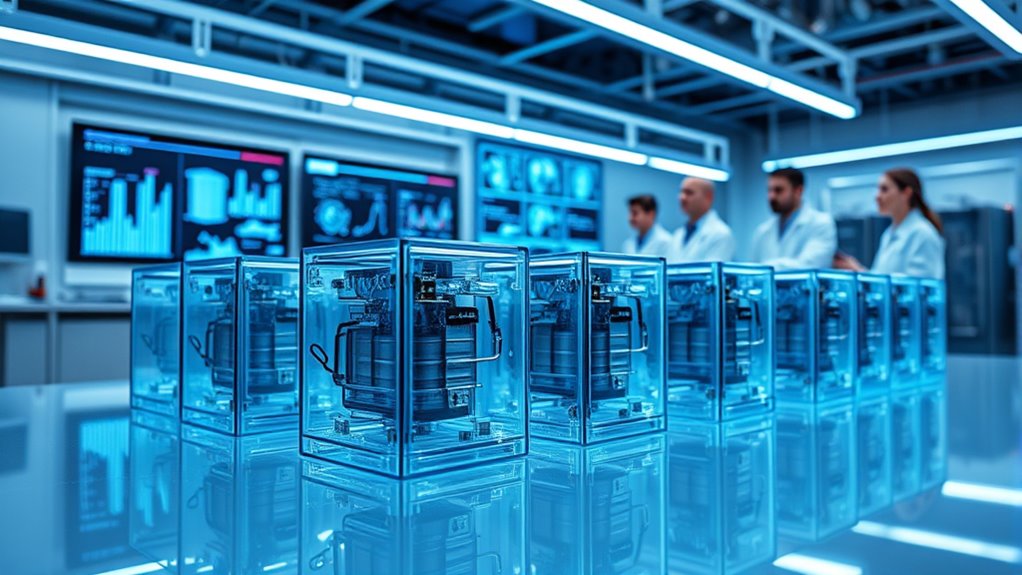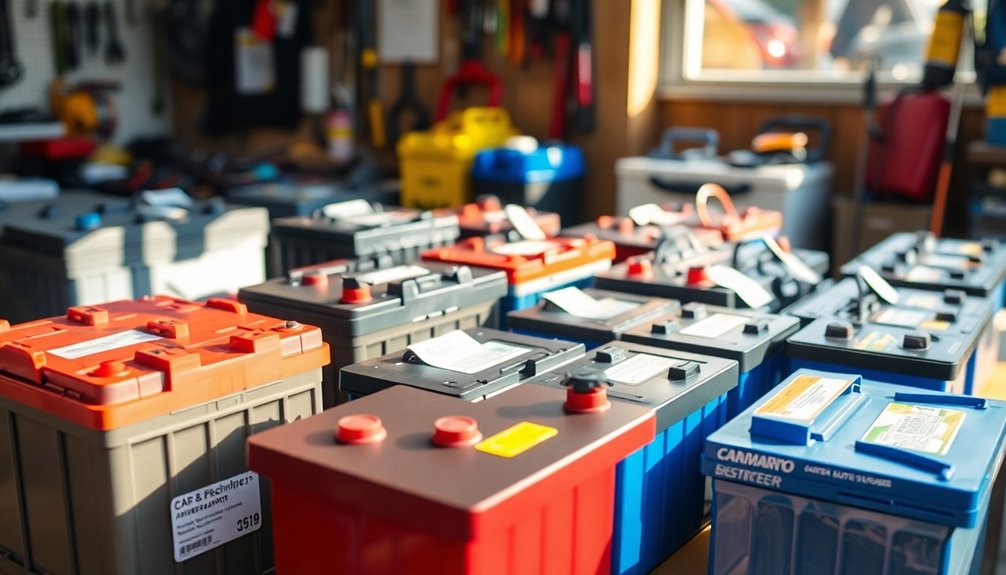Solid-state battery startups are making big strides toward revolutionizing energy storage with safer, higher-density solutions. They face manufacturing hurdles like handling fragile materials and scaling production, but those with clear plans, patents, and pilot lines are gaining attention. While they haven’t yet reached Tesla’s market dominance, their potential to transform industries is promising. If you want to understand how these startups are tackling challenges and aiming for major impact, you’ll find the details intriguing.
Key Takeaways
- Success depends on scalable, cost-effective manufacturing processes to meet high industry benchmarks.
- Startups with patents, pilot lines, or strategic alliances demonstrate stronger commercialization potential.
- Major automakers’ heavy investments set a high competitive bar for emerging solid-state battery companies.
- Overcoming manufacturing challenges for fragile materials is critical for transitioning from prototypes to mass production.
- Clear, pragmatic pathways to commercialization and funding are essential for startups aiming to revolutionize energy storage like Tesla.

Are solid-state technologies the next big leap in energy storage and electronics? If you’re exploring the future of batteries and innovative tech, this question is more relevant than ever. Solid-state batteries promise higher energy density, improved safety, and longer lifespan compared to traditional lithium-ion cells. For startups in this space, the key lies in mastering battery manufacturing processes that can scale efficiently while maintaining quality. You need to understand that shifting from lab prototypes to mass production isn’t straightforward—it demands significant investment strategies, including securing funding and establishing supply chains for specialized materials like solid electrolytes. Investors are increasingly eyeing this sector, recognizing the potential for disruptive growth, but they also want to see startups’ solid plans for overcoming production hurdles and commercialization challenges.
Solid-state battery startups must master scalable manufacturing, secure strategic funding, and forge key supply partnerships to succeed in this competitive, rapidly evolving sector.
As you evaluate these startups, consider how they’re approaching battery manufacturing. Unlike conventional cells, solid-state batteries require precise handling of fragile materials and innovative fabrication techniques. If you’re involved in supporting or funding such ventures, focus on whether they have a clear roadmap for scaling their manufacturing capabilities. Do they have partnerships with established suppliers? Are they investing in automation to improve consistency? These aspects are vital because even the most promising technology won’t succeed if it can’t be produced at scale cost-effectively. Your investment strategies should prioritize startups that demonstrate a deep understanding of these manufacturing intricacies, along with a realistic plan to bring solid-state batteries to market. Additionally, understanding the manufacturing challenges associated with fragile solid electrolytes is crucial to assessing the viability of these startups.
Furthermore, the competitive landscape is evolving quickly. Major automakers and tech giants are pouring billions into solid-state battery development, setting high benchmarks for startups to meet or surpass. This means your investment strategies need to be agile, focusing on startups with not only innovative technology but also clear paths to commercialization. Look for teams that have secured patents, built pilot lines, or formed strategic alliances with manufacturing partners. These indicators suggest they’re serious about overcoming the technical and logistical challenges ahead. By supporting companies that integrate solid-state battery production into their core business models, you help accelerate the shift toward safer, more efficient energy storage solutions.
In essence, the success of solid-state startups hinges on their ability to scale battery manufacturing efficiently and execute well-planned investment strategies. If they can do this, they’re poised to transform energy storage much like Tesla did for electric vehicles. As someone involved in this industry, your role is to identify those startups that combine innovative tech with pragmatic approaches to production and funding. That’s how you’ll distinguish the truly disruptive players and help shape the next chapter in battery technology.
Frequently Asked Questions
What Are the Main Technical Hurdles for Solid-State Battery Startups?
You face main technical hurdles like ensuring battery safety, as solid-state batteries can be prone to dendrite formation, risking short circuits. Manufacturing scalability is another challenge because producing these batteries reliably and cost-effectively at large volumes is complex. Overcoming these issues requires advanced materials and processes, but once addressed, solid-state batteries could revolutionize energy storage with higher energy density and improved safety.
How Do Solid-State Batteries Compare to Lithium-Ion in Cost?
You might think solid-state batteries are cheaper than lithium-ion, but the cost comparison isn’t straightforward. While they promise higher energy density and safety, manufacturing challenges drive up costs now. Currently, solid-state batteries are more expensive due to limited production scale and complex manufacturing processes. Over time, as startups overcome these hurdles, costs could decrease, but today, lithium-ion batteries remain more affordable for most applications.
Which Startups Are Leading in Solid-State Battery Innovation?
You’ll want to look at startups like QuantumScape and Solid Power, which are leading in solid-state battery innovation. They focus on developing solid state materials that promise enhanced battery longevity and safety compared to traditional lithium-ion tech. These companies are pushing the boundaries of energy density and durability, making them key players to watch as they aim to revolutionize the electric vehicle market with breakthrough solid-state solutions.
What Regulatory Challenges Do Solid-State Startups Face?
Imagine steering a maze of safety standards and regulatory hurdles, where each turn tests your innovation. Solid-state startups face complex safety standards and evolving regulations that can delay or block their progress. You must adapt quickly, ensuring compliance without sacrificing innovation. These regulatory challenges threaten to slow momentum, but with strategic navigation, you can clear the path toward market success and set new industry standards.
How Soon Might Solid-State Batteries Be Commercially Available?
You might wonder when solid-state batteries will hit the market. While some experts predict commercialization within 3 to 5 years, market adoption depends on overcoming manufacturing challenges and cost reductions. These batteries could substantially reduce environmental impact due to safer, more efficient materials. Stay tuned, as advancements are accelerating, and wider availability could reshape industries by offering safer, longer-lasting energy solutions sooner than expected.
Conclusion
While solid-state startups might not be the next Tesla just yet, they’re quietly paving the way for exciting possibilities. With ongoing innovations and promising breakthroughs, these companies could subtly reshape the future of energy and transportation. Keep an eye on them — their potential to gently transform industries is worth watching. Sometimes, the most subtle shifts lead to the biggest changes, and you never know when a quiet revolution might be just around the corner.










